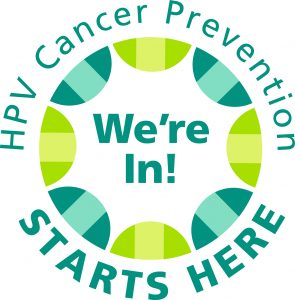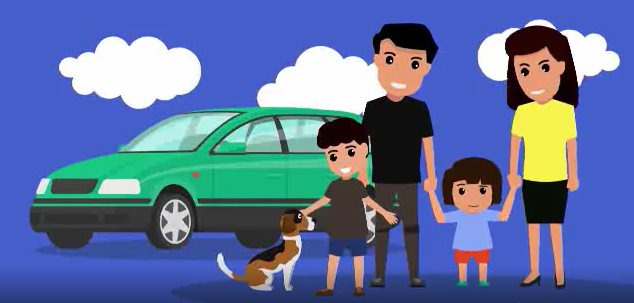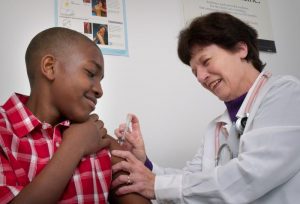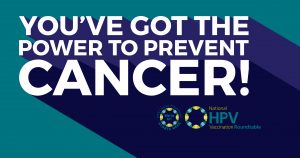
HPV VACCINE IS CANCER PREVENTION
The HPV Vaccine: Safe. Effective. Cancer prevention.

Media error: Format(s) not supported or source(s) not found
Download File: https://www.vdh.virginia.gov/content/uploads/sites/11/2019/10/HPVCommercial.mp4Human Papillomavirus (HPV)
HPV is a type of virus that is spread from person to person through skin-to-skin contact. There are many different types (strains) of HPV virus that can infect people. HPV infections are very common and almost everyone will be infected by some form of HPV in their lifetime.
HPV and Cancer
Infection with certain strains of HPV can lead to cancer. Most HPV infections will go away--and many infections might not even result in noticeable symptoms. However, some HPV infections will last longer and can develop into cancer. The most common cancers caused by HPV include cancers of the cervix, vagina, and vulva in women, cancer of the penis in men, and cancers of the throat and the anus in men and women.
Preventing HPV
Preventing HPV infection is difficult because the infection is very common and most people don't show any symptoms when the are infectious. The best way to prevent HPV infection is to be vaccinated with the HPV vaccine. The HPV vaccine prevents infection from nine different strains of HPV that are most commonly associated with cancer. The vaccine isn't just about preventing HPV, it's about preventing cancers caused by HPV, too!
"Someone You Love" - A film to learn more about HPV
HPV Vaccine

The HPV vaccine is safe and very effective. It prevents against nine different types (strains) of HPV that are most commonly associated with HPV-related cancers.
The vaccine is given as a two or three dose series (depending on age) during adolescence. It is important to receive the vaccine during this stage in life because adolescents have likely not yet been exposed to or infected with HPV and because their immune systems are capable of producing a strong immune response to the vaccine.
Vaccine Safety
The HPV vaccine has been studied extensively over the past decade and has been found to be safe and effective. The most common side effects of HPV vaccination are pain and redness at the injection site. These side effects are often mild and disappear quickly after receiving the vaccine. Some individuals who receive the HPV vaccine may experience nausea, headache, muscle or joint pain or dizziness and fainting, but these side effects are rare.
Photo credit: CDC.
Parents play a key role in HPV vaccination!
Parents play a key role in the health of their children--and that includes vaccinations like the HPV vaccine. Parents are encouraged to talk with their children and their children's doctor about the importance of HPV vaccination. Because the human papillomavirus is not communicable in a school setting, a parent or guardian, at the parent's or guardian's sole discretion, may elect for the parent's or guardian's child not to receive the HPV vaccine, after reviewing educational materials provided by the Board of Health describing the link between the human papillomavirus and cervical cancer.
Educational Material for Parents: English Version / Spanish Version
For more information and resources, visit the CDC HPV Website.
Child and Teen Vaccination Schedule Guide Now Available
Do you know which shots your child needs and at what age they should be given?
CDC has developed an easy-to-follow guide to child and teen vaccination schedules.
Consider printing a copy and keeping it with your child's medical records and bring it with you to their next pediatrician visit.
HPV Vaccine is important for students
HPV vaccine is an important vaccine for all students to receive! Boys and girls should receive the vaccine when they are 11-12 years old and in Virginia, the HPV is a Code-required vaccine for school entry.
For more information about the HPV vaccine requirements, please read the letter from the State Health Commissioner which explains more about HPV vaccination for students and a helpful infographic is also available which contains more information and HPV vaccine and cancer prevention.
HPV Vaccine Requirements
HPV vaccine is a Code-required vaccine for all students who attend public and private schools in Virginia. For information about school immunization requirements, please visit the VDH School Requirements page on the Division of Immunization website.
Immunization Schedule for Children and Teens
A simple, easy to follow immunization schedule for children and teens is available here.
2 Dose Decision Tree
Here is a simple and easy resource to help determine if a patient needs a 2 or 3 dose series of HPV vaccine. Click here.
Dental Health and HPV
Did you know that the human papillomavirus (HPV) can cause oropharyngeal cancer? Click HERE for a guide about HPV and oral health.
Earn FREE CE Credits and Prevent Cancer
 Physicians, registered nurses and pharmacists you have the opportunity to earn 1 CE for FREE from The National AHEC Organization! In 1 hour you will learn how to give an effective HPV vaccine recommendation to adolescents, successfully communicate with adolescents and their parents about the HPV vaccine, and receive up-to-date HPV vaccine, infection, and disease information you become the key to cancer prevention! Click here to learn cancer prevention strategies and earn FREE CE’s.
Physicians, registered nurses and pharmacists you have the opportunity to earn 1 CE for FREE from The National AHEC Organization! In 1 hour you will learn how to give an effective HPV vaccine recommendation to adolescents, successfully communicate with adolescents and their parents about the HPV vaccine, and receive up-to-date HPV vaccine, infection, and disease information you become the key to cancer prevention! Click here to learn cancer prevention strategies and earn FREE CE’s.

